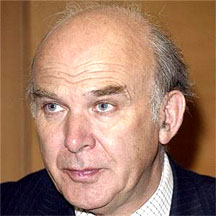LONDON, (Reuters) – British Business Secretary Vince Cable was stripped of power over the media sector but remained in government yesterday after he was taped “declaring war” on News Corp Chief Executive Rupert Murdoch.

The sacking of Cable, a Liberal Democrat, would have destabilised the Conservative-led coalition which has mapped out a tough austerity programme.
The Lib Dems’ poll ratings have slumped after their leadership including Cable backed higher tuition fees for students, breaking a pre-election pledge.
Prime Minister David Cameron regarded Cable’s comments as “unacceptable and inappropriate”, his office said in a statement which reprimanded Cable and curtailed his influence.
The Department for Culture, Media and Sport, led by Conservative Jeremy Hunt, will take charge of media regulation including News Corp’s bid to take full control of pay TV operator BSkyB.
News Corp wants to buy the 61 percent of BSkyB it does not already own for 7.8 billion pounds ($12.2 billion) to consolidate the business it helped build.
The European Commission on Tuesday granted unconditional approval for the bid, putting the ball back in Britain’s court.
Political analysts said the removal of Cable from the equation would reduce the chances of it being blocked. Hunt has in the past praised News Corp Murdoch’s role in developing Britain’s television news market.
Cable, 67, is one of the best known members of the Liberal Democrats, the junior partner in the Conservative-led government which took office in May, the country’s first coalition government since World War Two.
His pivotal role in the party and the desire not to disrupt the coalition saved his skin.
“The coalition needs a Vince Cable, first of all to keep the Lib Dems on board, he’s the man who can communicate with them far more than (party leader) Nick Clegg,” said Steven Fielding, director of Nottingham University’s Centre for British Politics.
Opposition Labour called Cable a “lame duck” and his diminished role could limit his ability to rein in bank bonuses, an issue on which he has been outspoken.
In comments originally made to two undercover reporters from the Daily Telegraph newspaper and obtained by the BBC, Cable said: “I have declared war on Mr Murdoch and I think we are going to win”.
Talking about the bid, Cable said: “I have blocked it using the powers that I have got and they are legal powers that I have got,” according to the recording.
Murdoch, an Australian-born U.S. citizen, is one of the best known media figures in Britain. He was a strong supporter of Conservative Prime Minister Margaret Thatcher in the 1980s and broke the power of the unions in the print industry. News Corp, which owns British newspapers The Sun, News of the World, Times and Sunday Times, condemned Cable’s comments.
“News Corporation is shocked and dismayed at the reports of Mr Cable’s comments. They raise serious questions about fairness and due process,” it said in a statement.
Cable apologised for his comments.
“I fully accept the decision of the Prime Minister and Deputy Prime Minister. I deeply regret the comments I made and apologise for the embarrassment that I have caused the government,” he said in a statement.
The British communications regulator Ofcom is examining the BSkyB deal to see if it would give News Corp too much control of the media in Britain, with the focus on content types, audiences, media platforms, control of media enterprises and future developments in the media landscape.




